
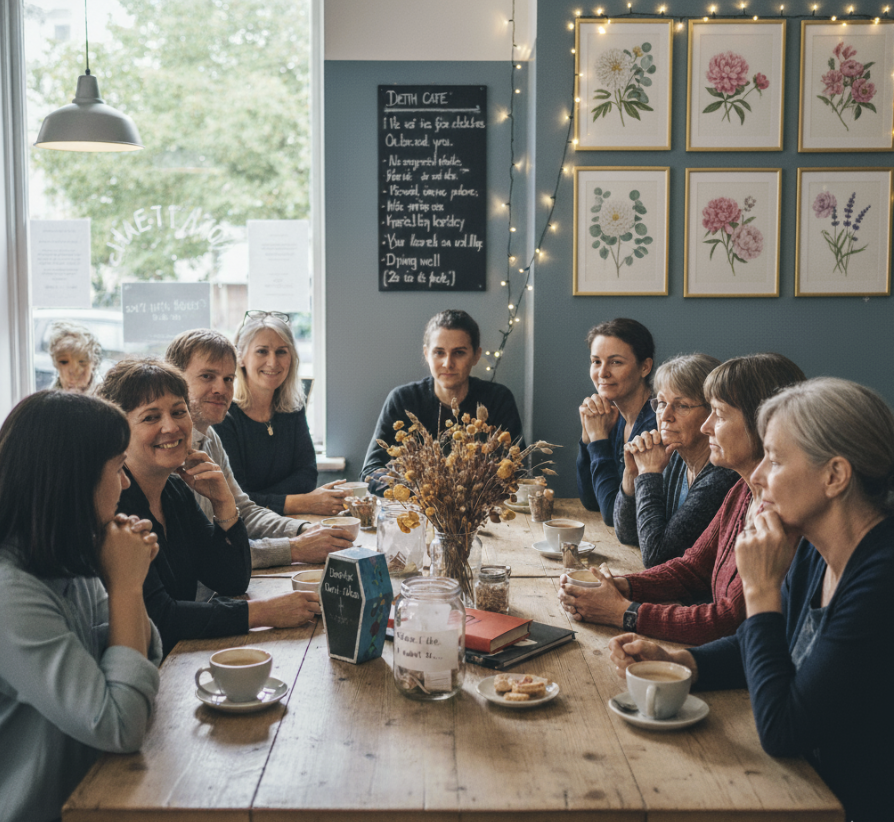
By Kathleen M. Rehl, Ph.D., CFP®, CeFT® Emeritus And Marian Bigelow
How Honest Conversations About Death Can Help Us Live More Fully
She was six when her father died. The adults whispered, the casseroles arrived, and the funeral happened without her. Decades later—sitting in a circle at one of our congregation’s Death Cafés—she spoke for the first time about the ache of being kept away, how “closure” never had a chance to form.
Another participant, teary-eyed, shared the recent death of her beloved cat. She hadn’t yet lost a close person, she said, and the depth of her grief frightened her. “What will happen when it’s my parent or partner?”
A third participant brought practical questions. He’d always assumed his body would be cremated—until learning about its environmental impact. Now he’s curious about human composting . . . but it’s not legal in his state. “What do I do?” he asked.
Many other participants have also opened up. One man living with incurable cancer wondered aloud about what comes next. A woman said she wasn’t afraid of death itself but feared a painful passing. Someone else asked, “What does hospice really do—for the whole family?”
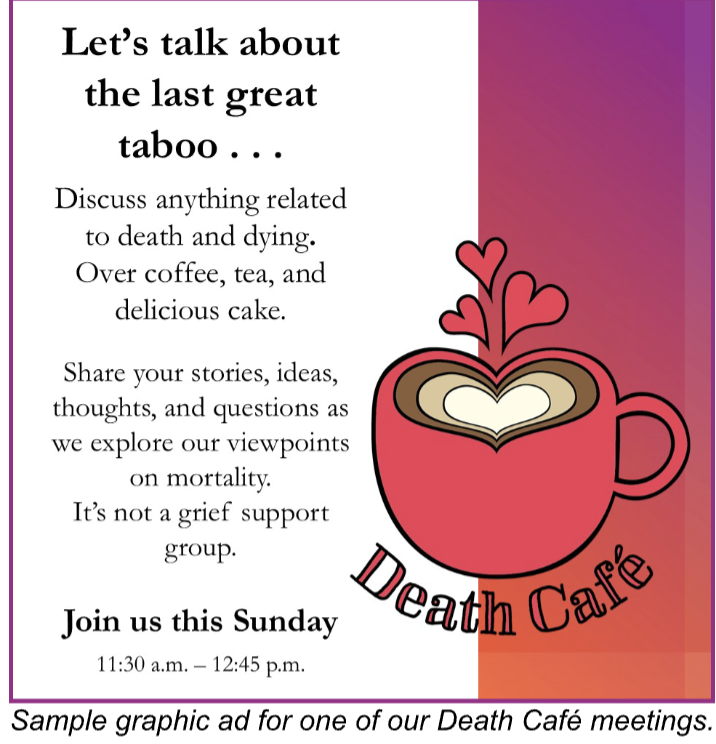
These are the kinds of honest, heartfelt moments that keep us coming back.
Together, as INELDA-trained end-of-life doulas, Marian Bigelow and I have co-hosted multiple Death Cafés in upstate New York—intimate gatherings filled with curiosity, courage, and connection. I’ve also facilitated several on my own in Florida. Each Café has been unique, tender, and deeply human.
What Is a Death Café, Really?
Want to try one? Use the official Death Café directory to search by location. You can also check with your local public library, hospice, senior center, or faith community—many of these organizations host Cafés regularly.
A Death Café is a group-led, open discussion about death, held in a respectful setting—preferably with tea and cake. The aim isn’t to grieve or make decisions; it’s to openly talk about mortality topics, helping people live more fully.
The movement began in the UK in 2011, inspired by Swiss sociologist Bernard Crettaz’s “Café Mortel.” Jon Underwood and his mother, psychotherapist Sue Barsky Reid, brought it into broader public awareness. Since then, thousands of Cafés have popped up around the world—in libraries, nonprofits, homes, Zoom rooms, and yes, congregations like ours.
What makes them so powerful is that they dissolve the silence and stigma surrounding death. They remind us that our questions, fears, and even humor about dying are not only normal—but worth sharing.
Why We Host These—And Keep Coming Back
In our roles as end-of-life doulas, we’ve held space at bedsides or in private consultations. But Death Cafés are different. They’re not intimate clinical sessions or structured workshops. They’re community gatherings where anyone can show up, speak, or listen.
When people first arrive, the room feels tentative. Will it be awkward? Morbid? But soon, stories surface. Laughter mixes with tears. Someone breaks the silence with a vulnerable truth. Someone else nods. A third shares a perspective no one had considered.
One woman told us, “This is the first time I’ve talked about death and didn’t feel judged or pitied.” Another said, “I expected fear. But I found relief.” Reactions like this remind us why these Cafés matter.
We’ve seen people come once and never return, and others who attend every time. There’s value in both.
Observations from the Circle
Hosting a Death Café: How We Do It
You don’t need to be a professional to host a Death Café, but a few simple practices help:
What People Talk About
We’ve heard so many beautiful, vulnerable, and practical conversations, including:
The point isn’t to come to a decision. It’s to create room for questions and curiosity. One woman said afterward, “I didn’t know how much I needed this.” Another told us, “Now I can finally talk to my kids about what I want.”
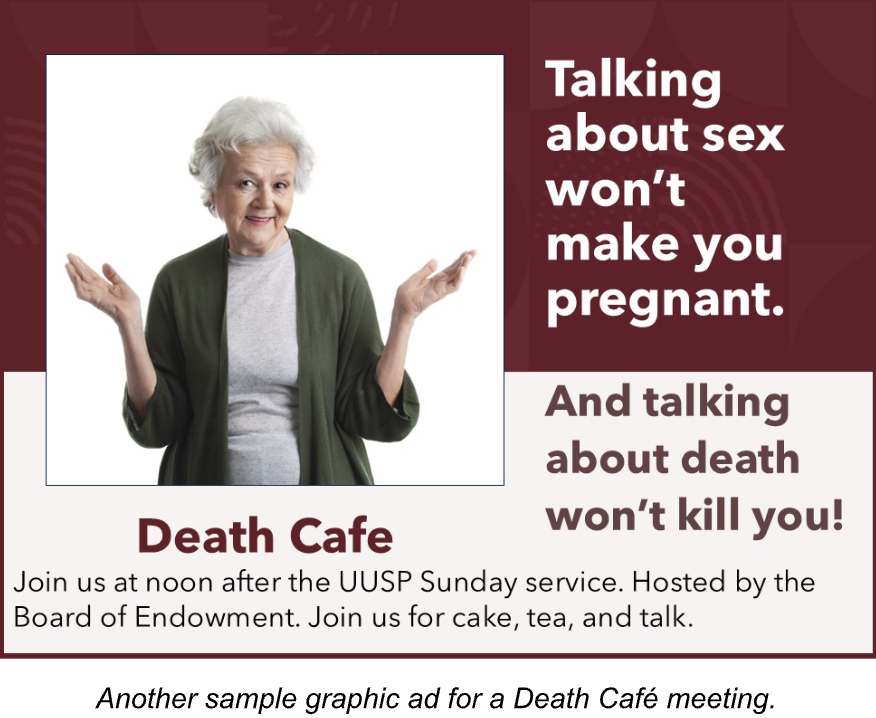
Talking About Death Is Talking About Life
A Death Café isn’t morbid. It’s real. Raw. Brave. Sometimes, even funny. And it helps people open up—about their fears, their hopes, their legacy, and the things they haven’t said yet. We’ve watched people leave lighter, braver, and more willing to take a next step.
And when people talk about death, they often end up talking about what gives life meaning—love, relationships, stories, and connection. That’s the paradox and the gift.
Talking about death won’t kill us, but it just might help us live more intentionally.
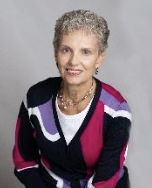
Kathleen M. Rehl, Ph.D., CFP®, CeFT® Emeritus blends her professional expertise with personal experience to help others live with purpose and plan meaningful legacies. An author, educator, and INELDA-trained end-of-life doula, she is adjunct faculty at The American College of Financial Services. Her book, Moving Forward on Your Own: A Financial Guidebook for Widows, grew out of her own experience as a widow and has guided thousands of women through difficult transitions. Today, Kathleen writes, speaks, and mentors in her “ReFirement” years while also facilitating conversations about life, death, and legacy. She divides her time between Florida, New York, and wherever her family travels take her. Her website is https://www.kathleenrehl.com.
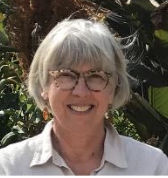
Marian Bigelow is an INELDA-trained end-of-life doula who brings warmth, compassion, and a touch of sweetness to the Death Cafés she facilitates. A graduate of the Culinary Institute of America, Marian is a talented baker. Her rich black fudge cake has become a much-loved staple at gatherings. Beyond the table, she is a dedicated advocate for end-of-life choices and actively supports the passage of New York’s Medical Aid in Dying (MAiD) Act. Indeed, her photograph appeared in The New York Times during a rally at the state capitol. Marian brings her full-hearted presence—from frosting to philosophy—to every circle she joins.